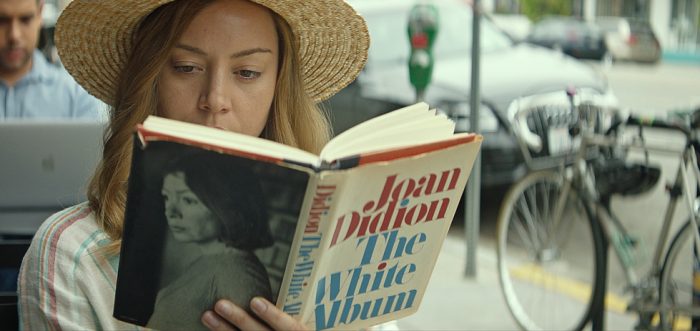
There is a certain reshaping of ideological paradigms that comes about when a society finds itself increasingly driven by technology. These shifts may be philosophical in nature, refiguring our very definition of humanity: of what it means to be human (as seen in the recent case of Sophia, the first robot to be granted citizenship). These changes also play out on a more microscopic level, say, affecting the interpersonal exchanges that shape our quotidian existence. We’ve seen this evolution play out in contemporary cinema too. A few screenshots of iMessage’s infamous three dots served as an unexpected source for much of the suspense underpinning Olivier Assayas’ 2016 psychological thriller, Personal Shopper. Matt Spicer shares Assayas’ interests in a society increasingly centred around technology, though his directorial debut Ingrid Goes West is a substantially different kind of contemporary twist on the thriller genre.
Ingrid (Aubrey Plaza) plays a lonely misfit with an addiction to Instagram. She scrolls through it obsessively – while eating, watching television and even when she’s sitting on the toilet. Her eyes are wide yet glazed over at. With a manic smile, her face lit by the blue light of her phone, she compulsively likes Instagram post after Instagram post. We first meet Ingrid mid-tantrum at the wedding of a ‘social influencer’ that she follows on the app. “Thanks for inviting me, bitch” she yells. She is dressed in track pants, makeup streaming down her cheeks. Ingrid is both the very incarnation of the worst cliches of her generation – a young woman existing purely in the fantasy universe of the internet – and also a contemporary twist on the age-old ‘hysterical woman’ trope. The scene cuts to one of Ingrid in a psychiatric unit. Her phone has been confiscated.
Certain recent films and television shows have been liable for the glamorisation of mental illness. The most high profile example is probably the Oscar-nominated Silver Linings Playbook (2012), which features Jennifer Lawrence as an alluring depressed person who falls in love with a man who cures his obsessive compulsive disorder by throwing away his medications and learning how to dance. Ingrid Goes West is a refreshing departure from this trend. Indeed, one of the core premises underpinning the film hinges on dispelling the fake realities portrayed on social media.
After leaving the psychiatric unit, Ingrid fixates on a new social media star: Taylor Sloane (Elizabeth Olsen). Ingrid locates Taylor’s favourite shops and brunch spots with haste, before moving to Los Angeles to ingratiate herself into Taylor’s inner circles – something she achieves by kidnapping her dog. As it turns out, it’s unsettlingly easy for Ingrid to inject herself into Taylor’s world. This isn’t because Ingrid is especially charming (indeed, she is the very opposite), but because she fuels Taylor’s narcissism. Whatever Taylor needs – be it financial support for her boyfriend’s terrible art, or a truck to move furniture with – Ingrid finds a way to provide it. It’s a cynical comment on both the mercantilism of modern relationships and the privacy that we forgo in exchange for likes. All of this is given an even darker rendering by the fact that Ingrid finances her friendship with Taylor through the money she recently inherited from her only friend: her deceased mother.
The most innovative aspect of Ingrid Goes West is Spicer’s unflinching intimacy in depicting Ingrid’s desperation. Ingrid is offered to us in all her grit and glory; with awkwardness as art. Spicer expertly wields the discomfort of Ingrid’s interactions as his primary tool for eliciting suspense and emotion. The film establishes itself as a psychological thriller, but there’s an atypicality in the viewpoint Ingrid Goes West offers. The story isn’t told through an objective lens, nor does it even attempt to offer distance. Spicer tells Ingrid Goes West through the viewpoint of the psycho and, in turn, the film hits into our own deepest social anxieties. Ingrid is the contemporary anti-hero for an image-saturated world, her only transgression being that she takes the false reality of Taylor’s Instagram universe too seriously. The film’s final moments see Ingrid broadcast her suicide on Snapchat. She wakes up in hospital to find that she has gone viral. It is the perfect ending: both the ultimate tragedy and the ultimate triumph.
